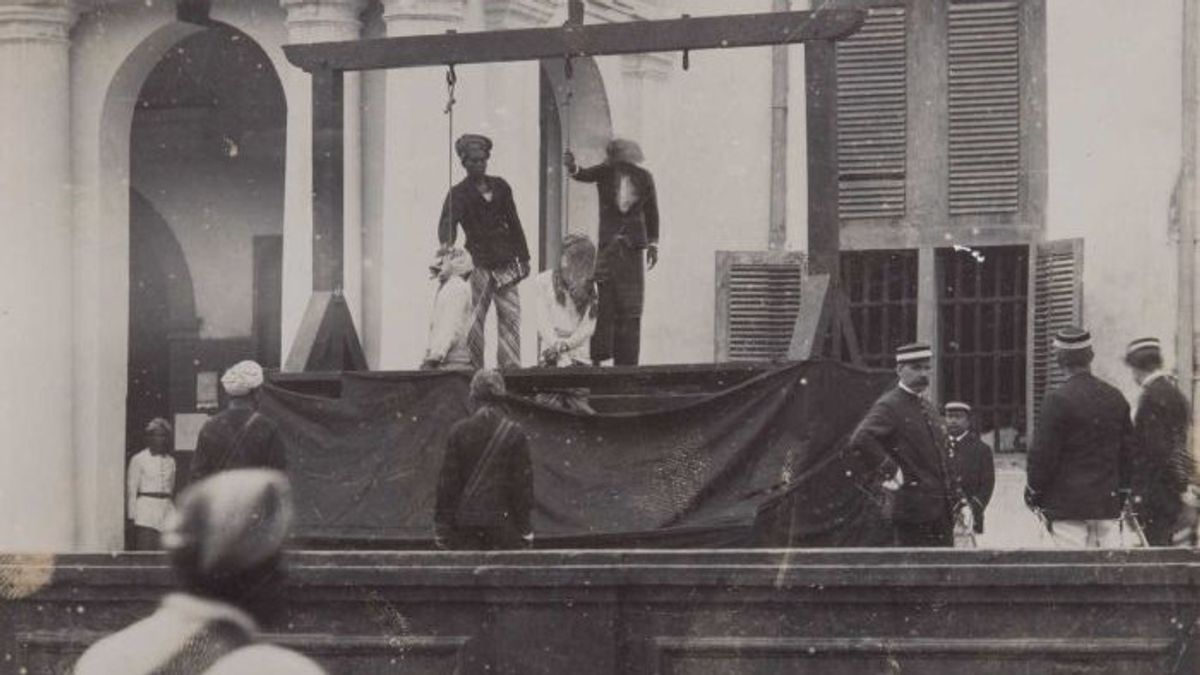JAKARTA - Entertainment is a form of human need. This is in accordance with the classic expression that humans are 'homo festivus', that is, creatures who enjoy festivals or entertainment. During the Dutch colonial period, the form of entertainment was sometimes unusual. Like watching people put to death at City Hall (Stadhuis), for example.
This activity is the entertainment of all classes. Every time there is news of a lawbreaker being executed, thousands of people will flock to witness the execution of the death penalty. In history, the death penalty was one of the most frequently applied in Batavia. Usually the death penalty is used to convict adulterers, murderers, and troublemakers.
For the Company, the death penalty could not only end the life of a criminal defendant, but also could be a strategy to legitimize Dutch rule over Batavia, especially in suppressing the rebellion. The execution of the death penalty was so frequent that it became commonplace, even a spectacle.
Alwi Shahab, in the book Batavia Kota Hantu (2010) explains, the company itself usually invites Batavia residents to watch the execution of the death penalty. Usually, the day before the execution, court officials would visit the villages around City Hall.
“With loudspeakers made of cans, they ordered residents to come to the square at City Hall in droves, which in Dutch is called Stadhuis. The place for beheading poles in the City Hall yard until the time of the Dutch was called Golgenveld, ”wrote Alwi, one of the important figures in the writing of Jakarta's history.
The picture of the excitement of the execution ceremony was also immortalized by the Dutch writer, Justus van Maurik. He, who visited the Dutch East Indies at the end of the 19th century, witnessed the hanging of an ethnic Chinese robber, Tjoe Boen Tjian in the courtyard of the City Hall which is now known as Taman Fatahillah.

Justus said he received information about the execution of the death penalty from people who had gathered at Societeit, an elite club at his time. The plan is that tomorrow at 07.00 am there will be execution of hanging for Tjoe Boen Tjian. Sentences were handed down for the crimes of the cruel murder of two women.
“I hesitated a little, but finally left on a crowded tram. 15 minutes later I arrived in front of the Stadhuis. There has been set up a hanging platform. A number of soldiers, infantry and cavalry formed a posse around it, "said Justus van Maurik in his writing Watching People Sentenced to Hang in the book" Ketoprak Jakarta "(2001).
On arrival at the location, all nations were seen watching, from native people, Arabs, Chinese, Europeans, to Armenians. Food and fruit sellers take advantage of the crowd to sell wares. In a rather relieved place, you can see an ice seller hitting a can to attract the buyer's attention. However, not many people want to drink ice in that condition, except for those who are used to witnessing the death penalty repeatedly.
"With a loud voice the prisoner uttered a few sentences to tell people not to imitate his actions. Then he tilted his head slightly to the left to fit it onto the rope. Suddenly the executioner pulled the rope. The drums sounded and the door on the floor burst open. The Chinese man's shoulders were pushed and the person standing in the hole pulled Tjoe Boen Tjiang's leg. Her face suddenly became bloodshot, her eyes bulged, and her lids were sticking out, ”added Justus van Maurik.
Justus said, his experience of witnessing the death penalty in person was quite gruesome. Especially when the executioner, who is a native of the nation, repeatedly exposed the white cloth covering his face to check whether the defendant was dead or not. That experience made Justus, the author of the popular book Indrukken van een "Totok," Indische type en schetsen (1897) often have nightmares afterward.
Those who were executedAmong the many people who were executed, there are several figures most remembered by the citizens of Batavia. They are the lovers of Sara Specx, Pieter Cortenhoeff and Chinese playboy, Oey Add Sia.
Sara Specx's story is related to her adultery scandal with Pieter Cortenhoeff in Kasteel Batavia in 1629. The adultery was considered an ethical violation. Sara did not escape punishment, even though she was the adopted son of the Governor-General of the VOC, Jan Pieterszoon Coen.
“One night, the young couple who were romantically drunk didn't realize the consequences of their actions. The poor girl who probably just got her period was 'in flagrante delicto' (caught) making out with her lover at Coen's house. And the sexual violation case at Batavia Castle became a hot scandal at that time, "wrote Achmad Sunjayadi in a book entitled (Not) Tabu di Nusantara (2018).
We have reviewed this story in the article The Beheaded Head and the Love Tragedy Behind the Term Masher. Long story short, both of them were sentenced to severe sentences on June 6, 1629. They were then executed right in front of the City Hall courtyard. The young man was beheaded. Meanwhile, the girl was punished by being dragged towards the City Hall gate to witness her lover's punishment.
Furthermore, the famous figure who was sentenced to death in front of the City Hall was Oey Add Sia. The wealthy Chinese young man who is known to be a womanizer has been charged with a series of murders, including poisoning his loyal maid. As a result, Oey Add Sia was thrown into prison by the local authorities. We have discussed his story in the Chinese Playboy Story, Oey Add Sia, who ended up at a hanging pole.
In a court ruling (landraad), Oey Add Sia was finally sentenced to hang to death in public. Even though Oey added Sia had appealed to a higher court (raad van justitie), the effort was in vain. In addition, his request for clemency to the Governor General was rejected.
"Thus, in 1851, Oey added Sia had to undergo a sentence of hanging to death which was carried out at dawn. The execution was carried out in the field in front of the Stadhuis or the city hall which is now called Fatahilah Park," said Benny G. Setiono in the Chinese book in Pusaran Politik (2003). .
The English, Chinese, Japanese, Arabic, and French versions are automatically generated by the AI. So there may still be inaccuracies in translating, please always see Indonesian as our main language. (system supported by DigitalSiber.id)










